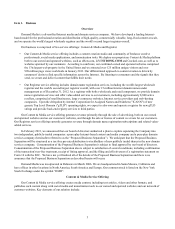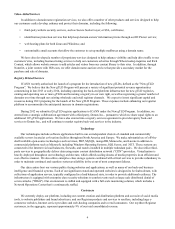Enom 2012 Annual Report Download - page 18
Download and view the complete annual report
Please find page 18 of the 2012 Enom annual report below. You can navigate through the pages in the report by either clicking on the pages listed below, or by using the keyword search tool below to find specific information within the annual report.13
Advertisers will not continue to do business with us if their investment in advertising with us does not generate sales leads, and
ultimately customers, or if we do not deliver their advertisements in an appropriate and effective manner. The failure of our
yield-optimized monetization technology to effectively match advertisements with our content in a manner that results in
increased revenue for our advertisers would have an adverse impact on our ability to maintain or increase our revenue from
advertising.
We rely on third-party ad-providers, such as Google, to provide advertisements on our owned and operated websites and
on our network of customer websites. Even if our content is effectively matched with such ad content, we cannot assure our
current advertisers will fulfill their obligations under their existing contracts, continue to provide advertisements beyond the
terms of their existing contracts or enter into any additional contracts. If any of our advertisers, but in particular Google,
decided not to continue advertising on our owned and operated websites and on our network of customer websites, we could
experience a rapid decline in our revenue over a relatively short period of time.
In addition, our customers who receive a portion of the revenue generated from advertisements matched with our content
displayed on their websites, may not continue to do business with us if our content does not generate increased revenue for
them. If we are unable to remain competitive and provide value to advertisers they may stop placing advertisements with us or
with our network of customer websites, which would negatively harm our business, revenue, financial condition and results of
operations.
Furthermore, brands and advertisers are increasingly focusing a portion of their online advertising budgets on social media
outlets such as Facebook as well as on advertising network exchanges. If this trend were to continue and we were unable to
offer competitive or similarly valued advertising opportunities, this could adversely impact our ability to maintain or increase
our revenue from advertising.
Lastly, we believe that advertising spending on the Internet, as in traditional media, fluctuates significantly as a result of a
variety of factors, many of which are outside of our control. These factors include:
• variations in expenditures by advertisers due to budgetary constraints;
• the cancellation or delay of projects by advertisers;
• the cyclical and discretionary nature of advertising spending;
• general economic conditions, as well as economic conditions specific to the Internet and online and offline media
industry; and
• the occurrence of extraordinary events, such as natural disasters, international or domestic terrorist attacks or armed
conflict.
If we are unable to generate advertising revenue due to factors outside of our control, then our business, financial condition
and results of operations would be adversely affected.
Since the success of our Content & Media service offering has been closely tied to the success of eHow, if eHow's
performance falters it could have a material adverse effect on our business, financial condition, and operations.
For both of the years ended December 31, 2011 and 2012, we generated approximately 31% of our revenue from eHow.
No other individual Content & Media site was responsible for more than 10% of our revenue in these periods.
eHow depends on various Internet search engines to direct traffic to the site. For year ended December 31, 2012, we
estimate that approximately 50% of eHow's page view traffic came from Google searches. The traffic directed to eHow and in
turn the performance of the content created for and distributed on eHow may be adversely impacted by a number of factors
related to Internet search engines, including the following: any further changes in search engine algorithms or methodologies
similar to those previously implemented by Google, some of which had a negative effect on search referral traffic to eHow and
a reduction in page views on eHow; our failure to properly manage SEO efforts for eHow; our failure to prevent internal
technical issues that disrupt traffic to eHow; or reduced reliance by Internet users on search engines to locate relevant content.
Additionally, we have already produced a significant amount of content that is housed on eHow and it may become difficult for
us to continue to identify topics and produce content with the same level of broad consumer appeal as the content we have
produced up to this point. A material adverse effect on eHow could result in a material adverse effect to Demand Media and its
business, financial condition, and results of operations.
























